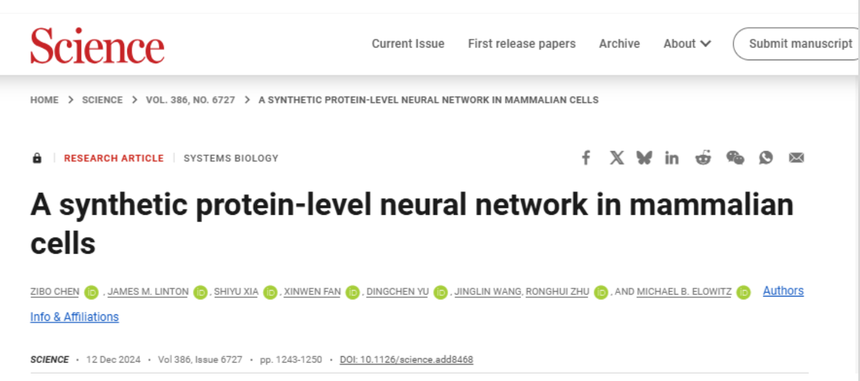Please click the button below to go to our email login page
|
33-year-old doctoral supervisor in Westlake University: loves flying planes and playing games, and wants to create a “toxin-free” lab.In June 2019, Zibo Chen’s meticulously planned research topic was preempted by a peer and published in Nature, which was undoubtedly a blow to him.
But his mentor, Michael Elowitz, offered a new perspective: “First, this shows you can propose high-quality research topics, and fortunately, you haven’t invested too much sunk cost.” Chen Zibo overcame his disappointment and started thinking about new research topics.
In December 2024, Zibo Chen published a result in Science after five years of work — the first use of protein-synthesized neural networks in mammalian cells.
Zibo Chen has a rich life experience, and hobbies of piloting small aircraft and playing “The Legend of Zelda”. He believes that scientific research is like exploring a game world, and discovering the unknown is the most thrilling moment.
Protein-based artificial neural networks
The paper, published in December 2024, demonstrates “the feasibility of constructing simulated artificial neural networks in living cells using synthetic proteins for complex signal classification”.
Zibo Chen and his team designed a protein-based system in living cells. The system can process multiple signals and make decisions based on them, such as determining whether the cell should survive or undergo programmed cell death.
When it comes to the origin of the inspiration for the project, Zibo Chen mentioned a colleague, Professor Lulu Qian from the Department of Bioengineering at the California Institute of Technology.
In 2018, Lulu Qian’s lab constructed a DNA-based neural network in a test tube that could recognize handwritten numbers. Zibo Chen’s research achievement, however, is creating a protein-based neural network inside living cells that can classify intracellular signals.
A “journey” of 14 years
In 2013, after completing his undergraduate studies, Zibo Chen went to the University of Washington for his PhD, supervised by David Baker and Frank DiMaio. Zibo Chen describes David Baker as a “pure scientist” who, despite his simple lifestyle, is well-informed about the research topics of his over 80 lab members. Frank DiMaio, another mentor, was very “supportive” to students and taught him a lot of programming knowledge, according to Zibo Chen’s recollection,
Zibo Chen’s postdoctoral supervisor, Michael Elowitz, is a big shot and a pioneer in modern synthetic biology, who is approachable, open-minded, flexible, and optimistic.
These 14 years abroad have greatly shaped this young scientist. Zibo Chen admits this experience has brought him a broader international perspective, forming a unique understanding of scientific research.
“You’ll find there are many different ideas in the world that can coexist and inspire each other. Different ideas, personalities, and behavioral patterns can all be embraced. This is one of the charms of scientific research.” Chen said.
A “toxin-free” lab
In August 2022, after 14 years of overseas research, Zibo Chen returned to Hangzhou and took a full-time job in West Lake University.
For Zibo Chen, Hangzhou is not only his hometown that he dreams of, but also a place that carries his small wish: to create a vibrant research environment - a “toxin-free” lab and to cultivate a group of young scientists who are pure, upright, and passionate about research.
A “toxin-free” lab refers to an environment where mentors and students respect each other, without malicious competition and excessive pressure. Here, everyone can freely explore scientific questions and collaborate in a pleasant and inclusive atmosphere. |

